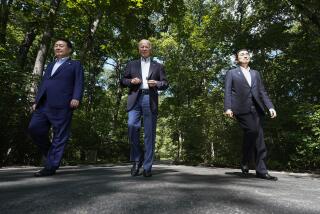Clinton to Visit S. Korea in Bid to Signal Solidarity
- Share via
TOKYO — President Clinton’s decision to swing by South Korea next month will send a crucial signal of solidarity between the two allies amid growing volatility in North Korea, elated officials in Seoul said Friday.
South Korean officials had fretted that Clinton’s earlier decision not to stop in their country en route to a state visit to Japan on April 16 would give the impression of a drift in the relationship that Pyongyang could exploit, officials said.
A fierce lobbying campaign to persuade Clinton to change his mind was launched by officials in Washington and Seoul.
“We were very much concerned that, if the American president didn’t come to Korea when he’s making an official visit to Japan, it would send the wrong signal to North Korea,” said Kim Bong Hyun of the Foreign Ministry in a telephone interview from Seoul. “If President Clinton had not come, it would look like our security cooperation was not completely firm.”
Seoul has sought assurances that it will not be shunted aside as ties grow between Washington and Pyongyang--in the form of emergency food aid, planned liaison offices and warmer economic relations.
Clinton’s initial decision to bypass Seoul had also stirred some public angst that the United States valued its relationship with Japan more than with South Korea.
The White House announced that Clinton will stop at the southern island of Cheju on April 16 to meet with President Kim Young Sam before flying to Tokyo later in the day. The decision was made after visits to Washington by U.S. Ambassador James T. Laney and South Korean Foreign Minister Gong Ro Myong.
The two sides are likely to focus on North Korea’s increasingly volatile social and economic situation.
Flooding and famine have pushed the sagging economy into ever-deeper straits, and a shortage of fuel has reportedly forced the nation to begin shutting down its major steel plant.
North Korea has also recently moved weapons and a million troops near the Demilitarized Zone--including combat planes capable of reaching South Korea’s presidential mansion and the U.S. military headquarters in six minutes, according to Gen. Gary E. Luck, commander of the U.S. forces in South Korea.
“We worry that, in a very short period, this country will either collapse or take aggressive actions against the South in a desperate attempt to divert attention from its internal situation,” Luck told the U.S. House of Representatives national security appropriations subcommittee this month.
The question, he said, “is not, ‘Will this country disintegrate?’ but rather, ‘How will it disintegrate--by implosion or explosion? And when?’ ”
That view, however, is not uniformly shared in South Korea, where some experts believe that Pyongyang has exaggerated its problems to gain international aid and support.
*
The Clinton visit will provide a chance to bridge the differences and discuss how to prepare for North Korea’s inevitable decline, said Seo Hang Lee, a defense expert.
Other possible issues include South Korean requests to gain earlier custody of U.S. military criminal suspects and the recent tensions between China and Taiwan.
Trade issues are not likely to command much attention, as they will during Clinton’s visit to Japan, because the $45-billion trade relationship between the United States and South Korea is nearly in balance.
The visit may also boost Kim’s stature as his party faces the possible loss of a ruling majority in the April 11 National Assembly elections.
More to Read
Sign up for Essential California
The most important California stories and recommendations in your inbox every morning.
You may occasionally receive promotional content from the Los Angeles Times.














